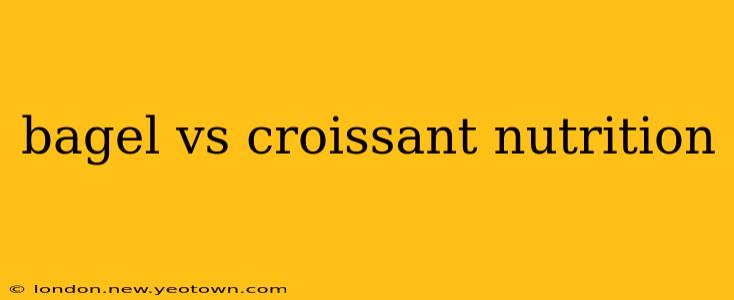The breakfast battle of the baked goods is on! Bagels and croissants, both beloved for their buttery textures and satisfying carbs, often grace our plates in the morning. But when it comes to nutrition, which one reigns supreme? The answer, as with most things in life, is "it depends." Let's delve into a delicious comparison, exploring the nutritional differences and helping you make the most informed choice for your breakfast (or snack!).
What's in a Bagel?
Imagine biting into a chewy, dense bagel. The satisfying texture comes from its simple ingredients: primarily enriched flour, water, and yeast. A plain bagel, before any toppings, is relatively low in fat and offers a decent dose of carbohydrates for sustained energy. However, the nutritional profile can change dramatically depending on size and additions. A large everything bagel, for example, can pack in a significant amount of sodium and calories from seeds and seasonings.
Nutritional Highlights (Plain, Medium-Sized Bagel):
- Carbohydrates: The primary source of energy. Provides fiber, but the amount varies depending on the type of flour used.
- Protein: A modest amount, contributing to satiety.
- Fat: Relatively low in fat, unless you add butter, cream cheese, or other toppings.
- Vitamins and Minerals: Provides small amounts of certain vitamins and minerals, depending on the flour and any added ingredients.
The Allure of the Croissant
Now, picture the delicate, flaky layers of a warm croissant. That irresistible crispness comes from a rich, buttery dough, expertly layered and baked to perfection. Croissants are undeniably indulgent, packing a more significant calorie and fat punch compared to their bagel counterpart. Their high fat content, primarily from butter, contributes to their rich flavor and texture. However, this also elevates their calorie count considerably.
Nutritional Highlights (Medium-Sized Croissant):
- Carbohydrates: Provides energy, but generally less fiber than a bagel.
- Protein: Similar to a bagel, a moderate amount contributing to fullness.
- Fat: Significantly higher in fat than a bagel, largely from butter.
- Vitamins and Minerals: Similar to bagels, offers small amounts of certain vitamins and minerals.
Bagel vs. Croissant: Which is Healthier?
There's no single "healthier" choice between a bagel and a croissant. It all comes down to portion control and ingredient choices.
Factors to consider:
- Size matters: A large bagel or a particularly large croissant can significantly impact the calorie and fat content.
- Toppings and fillings: Adding cream cheese, butter, or sugary spreads drastically alters the nutritional profile of both.
- Type of flour: Whole-wheat bagels offer more fiber and nutrients than refined-flour bagels.
- Added sugars: Avoid croissants or bagels with added sugars for a healthier option.
What are the best ways to make bagels and croissants healthier?
Many people want to enjoy these breakfast treats but are conscious of their health. Here's how to make them slightly healthier choices:
- Choose whole-wheat: Opt for whole-wheat bagels for increased fiber and nutrients. Look for croissants made with whole-wheat flour (though these are less common).
- Control portions: Stick to a smaller size to manage calories and fat intake.
- Healthy toppings: Load up bagels with healthy toppings like avocado, tomato, or a thin smear of nut butter instead of high-fat cream cheese.
Are there any specific health benefits associated with eating bagels or croissants?
While neither offers overwhelming health benefits, both provide energy. The fiber in whole-wheat bagels can aid in digestion. Ultimately, neither food is a key source of vital nutrients, so balance is key.
What are some good alternatives to bagels and croissants?
If you're looking for healthier breakfast options, consider:
- Oatmeal: High in fiber and nutrients.
- Yogurt with fruit: A good source of protein and probiotics.
- Whole-wheat toast with avocado: A satisfying and healthy combination.
Conclusion: Enjoy in Moderation!
Both bagels and croissants can be part of a balanced diet, but mindful choices are crucial. By being aware of portion sizes, ingredient choices, and choosing healthier alternatives when possible, you can enjoy these delicious baked goods without sacrificing your health goals. Remember, moderation is key to enjoying your favorite treats without guilt!

